| Listing 1 - 10 of 37 | << page >> |
Sort by
|
Book
Year: 2010 Publisher: [Place of publication not identified] : Project Gutenberg,
Abstract | Keywords | Export | Availability | Bookmark
 Loading...
Loading...Choose an application
- Reference Manager
- EndNote
- RefWorks (Direct export to RefWorks)
Book
ISBN: 9780511536441 9780521728591 9780511438431 0511438435 9780511434129 051143412X 0511437765 9780511437762 0521728592 0511536445 1107193133 0511436300 0511435517 0511437080 Year: 2008 Publisher: Cambridge Cambridge University Press
Abstract | Keywords | Export | Availability | Bookmark
 Loading...
Loading...Choose an application
- Reference Manager
- EndNote
- RefWorks (Direct export to RefWorks)
How do I get started in astronomy? Should I buy binoculars or a telescope? What can I expect to see? This wonderful informal guide to astronomy has all the information an absolute beginner needs to get started. It explains the basic techniques and equipment you need for exploring the night sky, from observing with the naked eye to using binoculars and telescopes. It then takes you on a tour of the night sky, covering the Moon, Sun, stars, planets, and more. The book gives sound advice on purchasing affordable binoculars, telescopes, and accessories, and is illustrated with photos taken by the author, showing how objects in the sky actually look through modest amateur equipment. Whether you are a parent thinking of buying a telescope for your children, or a newcomer yourself, this book has all you need to know to take the first steps into the fascinating world of astronomy.
Book
Year: 2019 Publisher: [Place of publication not identified] : Good Press,
Abstract | Keywords | Export | Availability | Bookmark
 Loading...
Loading...Choose an application
- Reference Manager
- EndNote
- RefWorks (Direct export to RefWorks)
Book
Year: 2015 Publisher: Project Gutenberg
Abstract | Keywords | Export | Availability | Bookmark
 Loading...
Loading...Choose an application
- Reference Manager
- EndNote
- RefWorks (Direct export to RefWorks)
Scientific recreations --- Handbooks --- manuals --- etc. --- Tricks --- Chemistry --- Experiments
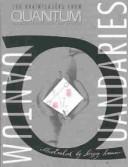
ISBN: 1933531665 9781933531663 0873551362 9780873551366 Year: 1996 Publisher: Arlington, VA National Science Teachers Association
Abstract | Keywords | Export | Availability | Bookmark
 Loading...
Loading...Choose an application
- Reference Manager
- EndNote
- RefWorks (Direct export to RefWorks)
For extra credit or just for the fun of it-why not try a brainteaser? This collection brings together the first 100 brainteasers from Quantum magazine, published by the National Science Teachers Association in collaboration with the Russian magazine Kvant. Through its pages, you'll find number rebuses, geometry ticklers, logic puzzles, and quirky questions with a physics twist. Students and teachers alike will enjoy these fun quandaries.
Mathematical recreations. --- Mathematics --- Scientific recreations. --- Amusements --- Mathematical puzzles --- Number games --- Recreational mathematics --- Recreations, Mathematical --- Puzzles --- Scientific recreations --- Games in mathematics education --- Magic squares --- Magic tricks in mathematics education
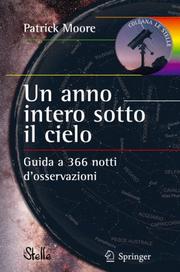
ISBN: 1281344699 9786611344696 8847005426 8847005418 Year: 2007 Publisher: Milano : Springer-Verlag Italia,
Abstract | Keywords | Export | Availability | Bookmark
 Loading...
Loading...Choose an application
- Reference Manager
- EndNote
- RefWorks (Direct export to RefWorks)
Ci sono 365 notti in un anno (366 se bisestile) e per l’astrofilo non ce ne sono mai due uguali. Il cielo ogni notte propone un suo show che ha per protagonisti migliaia di oggetti come stelle, costellazioni, pianeti, nebulose, da riconoscere uno ad uno, da ammirare e studiare. Sir Patrick Moore – celeberrimo conduttore televisivo inglese, astrofilo e divulgatore noto in tutto il mondo – ha scritto questo libro per suggerire all’amante del cielo quali oggetti di particolare interesse possono essere osservati in ciascuna diversa notte dell’anno. Vengono proposte mappe stellari di facile interpretazione, mentre il testo tratta di fisica, delle stelle e della loro storia, di sistemi binari, galassie, della Luna e dei pianeti: di tutto ciò che la volta celeste offre all’astrofilo curioso. Cosa hanno detto della prima edizione NEW SCIENTIST "…ben scritto e pieno di entusiasmo." ASTRONOMY & SPACE "Patrick Moore si è ripetuto. Che libro eccellente è questo.".
Book
ISBN: 1614441030 9781614441038 9780883857762 0883857766 Year: 2012 Publisher: [Washington, D.C.]
Abstract | Keywords | Export | Availability | Bookmark
 Loading...
Loading...Choose an application
- Reference Manager
- EndNote
- RefWorks (Direct export to RefWorks)
Mathematics Galore! Showcases some of the best activities and student outcomes of the St. Mark's Institute of Mathematics and invites you to engage the mathematics yourself! Revel in the delight of deep intellectual play and marvel at the heights to which young scholars can rise. See some great mathematics explained and proved via natural and accessible means. Based on 26 essays ("newsletters") and eight additional pieces, Mathematics Galore! offers a large sample of mathematical tidbits and treasures, each immediately enticing, and each a gateway to layers of surprising depth and conundrum. Pick and read essays in no particular order and enjoy the mathematical stories that unfold. Be inspired for your courses, your math clubs and your math circles, or simply enjoy for yourself the bounty of research questions and intriguing puzzlers that lie within.
Mathematics --- Mathematical recreations. --- Mathematical puzzles --- Number games --- Recreational mathematics --- Recreations, Mathematical --- Puzzles --- Scientific recreations --- Games in mathematics education --- Magic squares --- Magic tricks in mathematics education --- Study and teaching.
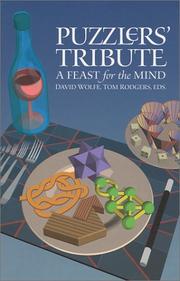
ISBN: 0429062400 1439864101 9781439864104 9781568811215 9780429062407 1040053122 Year: 2002 Publisher: Natick, Mass. : A.K. Peters,
Abstract | Keywords | Export | Availability | Bookmark
 Loading...
Loading...Choose an application
- Reference Manager
- EndNote
- RefWorks (Direct export to RefWorks)
This second collection of interesting mathematical puzzles continues the tribute to Martin Gardner, who has provided us with original puzzles and puzzling stories ever since he created and produced the "Mathematical Games" column in Scientific American. The international community of puzzle enthusiasts has gathered once again to celebrate Martin Gardner's continued contribution and, most fittingly, has done so in kind, by providing new challenges to our inquiring minds. We proudly present this collection to the mathemagicians of the world for their enjoyment, as a playful provocation.
Mathematical recreations. --- Mathematical puzzles --- Number games --- Recreational mathematics --- Recreations, Mathematical --- Puzzles --- Scientific recreations --- Games in mathematics education --- Magic squares --- Magic tricks in mathematics education
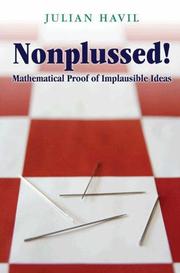
ISBN: 1400837383 128272200X 9786612722004 0691120560 0691148228 9780691120560 9781400837380 9780691148229 6612722002 Year: 2010 Publisher: Princeton, NJ
Abstract | Keywords | Export | Availability | Bookmark
 Loading...
Loading...Choose an application
- Reference Manager
- EndNote
- RefWorks (Direct export to RefWorks)
Math--the application of reasonable logic to reasonable assumptions--usually produces reasonable results. But sometimes math generates astonishing paradoxes--conclusions that seem completely unreasonable or just plain impossible but that are nevertheless demonstrably true. Did you know that a losing sports team can become a winning one by adding worse players than its opponents? Or that the thirteenth of the month is more likely to be a Friday than any other day? Or that cones can roll unaided uphill? In Nonplussed!--a delightfully eclectic collection of paradoxes from many different areas of math--popular-math writer Julian Havil reveals the math that shows the truth of these and many other unbelievable ideas. Nonplussed! pays special attention to problems from probability and statistics, areas where intuition can easily be wrong. These problems include the vagaries of tennis scoring, what can be deduced from tossing a needle, and disadvantageous games that form winning combinations. Other chapters address everything from the historically important Torricelli's Trumpet to the mind-warping implications of objects that live on high dimensions. Readers learn about the colorful history and people associated with many of these problems in addition to their mathematical proofs. Nonplussed! will appeal to anyone with a calculus background who enjoys popular math books or puzzles.
Mathematical recreations. --- Mathematics --- Paradox --- Mathematics. --- Mathematical puzzles --- Number games --- Recreational mathematics --- Recreations, Mathematical --- Figures of speech --- Logic --- Contradiction --- Puzzles --- Scientific recreations --- Games in mathematics education --- Magic squares --- Magic tricks in mathematics education --- Miscellanea.
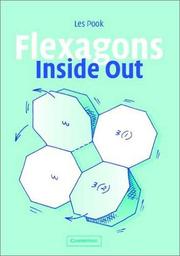
ISBN: 1107135877 128043063X 9786610430635 0511180284 0511078455 0511204396 0511307241 0511543301 0511076886 9780511078453 9780511543302 0521819709 9780521819701 0521525748 9780521525749 9780511075346 0511075340 Year: 2003 Publisher: Cambridge New York Cambridge University Press
Abstract | Keywords | Export | Availability | Bookmark
 Loading...
Loading...Choose an application
- Reference Manager
- EndNote
- RefWorks (Direct export to RefWorks)
Flexagons are hinged polygons that have the intriguing property of displaying different pairs of faces when they are flexed. Workable paper models of flexagons are easy to make and entertaining to manipulate. Flexagons have a surprisingly complex mathematical structure and just how a flexagon works is not obvious on casual examination of a paper model. Flexagons may be appreciated at three different levels. Firstly as toys or puzzles, secondly as a recreational mathematics topic and finally as the subject of serious mathematical study. This book is written for anyone interested in puzzles or recreational maths. No previous knowledge of flexagons is assumed, and the only pre-requisite is some knowledge of elementary geometry. An attractive feature of the book is a collection of nets, with assembly instructions, for a wide range of paper models of flexagons. These are printed full size and laid out so they can be photocopied.
Polyhedra. --- Polyhedra --- Mathematical recreations --- Mathematics --- Physical Sciences & Mathematics --- Geometry --- Mathematical puzzles --- Number games --- Recreational mathematics --- Recreations, Mathematical --- Puzzles --- Scientific recreations --- Games in mathematics education --- Magic squares --- Magic tricks in mathematics education --- Geometrical models --- Models --- Mathematical recreations. --- Models.
| Listing 1 - 10 of 37 | << page >> |
Sort by
|

 Search
Search Feedback
Feedback About UniCat
About UniCat  Help
Help News
News